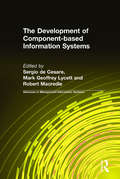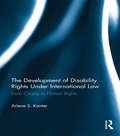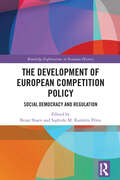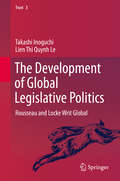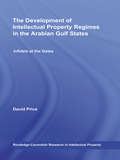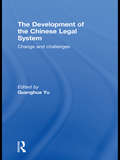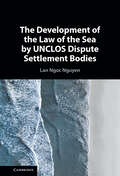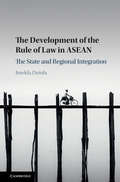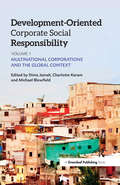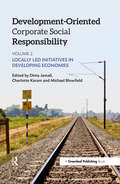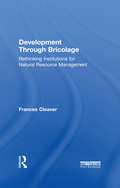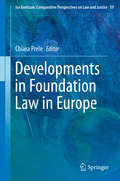- Table View
- List View
The Development of Child Protection Law and Policy: Children, Risk and Modernities (Studies in Citizenship, Human Rights and the Law)
by Kieran WalshThis book examines how child protection law has been shaped by the transition to late modernity and how it copes with the ever-changing concept of risk. The book traces the evolution of the contemporary child protection system through historical changes, assessing the factors that have influenced the development of legal responses to abuse over a 130-year period. It does so by focussing on the Republic of Ireland where child protection has become emblematic of wider social change. The work draws on a wide range of primary and secondary sources including legislation, case law and official and media reports of child protection inquiries. It also utilises insights developed through an extensive examination of parliamentary debates on child protection matters. These materials are assessed through the lens of critical discourse analysis to explore the relationship between law, social policy and social theory as they effect child protection. While the book utilises primarily Irish sources, this multidisciplinary approach ensures the argument has international applicability. The book will be a valuable resource for all those with an interest in the development of child protection law.
The Development of Child Protection Systems in the Post-Soviet States: A Twenty Five Years Perspective (Child Maltreatment #12)
by Ilze Earner Alexandra TelitsynaThis volume provides an understanding of how systems of child protection evolve in disparate cultural, social and economic contexts. Using the former Soviet Union as a starting point, it examines how 13 countries have developed, defined and evolved their system of protecting children and providing services to families over the last 25 years since independence. The volume runs an uniform approach in each country and then traces the development of unique systems, contributing to the international understanding of child protection and welfare. This volume is a fascinating study for social scientists, social workers, policy makers with particular interest to those focusing on children, youth, and family issues alike as each chapter offers a clear and compelling view of the central changes, competing claims and guiding assumptions that have formed each countries individual approach to child protection and family services.
The Development of Component-based Information Systems (Advances In Management Information Systems Ser.)
by Sergio de Cesare Mark Geoffrey Lycett Robert MacredieThis work provides a comprehensive overview of research and practical issues relating to component-based development information systems (CBIS). Spanning the organizational, developmental, and technical aspects of the subject, the original research included here provides fresh insights into successful CBIS technology and application. Part I covers component-based development methodologies and system architectures. Part II analyzes different aspects of managing component-based development. Part III investigates component-based development versus commercial off-the-shelf products (COTS), including the selection and trading of COTS products.
The Development of Consumer Credit in Global Perspective
by Jan LogemannThis volume brings together historians, economists, political scientists, and anthropologists to present a global perspective on the new forms of lending and borrowing that have become a key feature of twentieth-century mass consumer societies, emphasizing comparative and transnational historical perspectives.
The Development of Disability Rights Under International Law: From Charity to Human Rights
by Arlene S. KanterThe adoption of the Convention on the Rights of People with Disabilities (CPRD) by the United Nations in 2006 is the first comprehensive and binding treaty on the rights of people with disabilities. It establishes the right of people with disabilities to equality, dignity, autonomy, full participation, as well as the right to live in the community, and the right to supported decision-making and inclusive education. Prior to the CRPD, international law had provided only limited protections to people with disabilities. This book analyses the development of disability rights as an international human rights movement. Focusing on the United States and countries in Asia, Africa, the Middle East the book examines the status of people with disabilities under international law prior to the adoption of the CPRD, and follows the development of human rights protections through the convention’s drafting process. Arlene Kanter argues that by including both new applications and entirely new approaches to human rights treaty enforcement, the CRPD is significant not only to people with disabilities but also to the general development of international human rights, by offering new human rights protections for all people. Taking a comparative perspective, the book explores how the success of the CRPD in achieving protections depends on the extent to which individual countries enforce domestic laws and policies, and the changing public attitudes towards people with disabilities. This book will be of excellent use and interest to researchers and students of human rights law, discrimination, and disability studies.
The Development of Ethics A Historical and Critical Study Volume III: From Kant to Rawls
by Terence IrwinThis book is a selective historical and critical study of moral philosophy in the Socratic tradition, with special attention to Aristotelian naturalism. It discusses the main topics of moral philosophy as they have developed historically, including: the human good, human nature, justice, friendship, and morality; the methods of moral inquiry; the virtues and their connexions; will, freedom, and responsibility; reason and emotion; relativism, subjectivism, andrealism; the theological aspect of morality. The first volume discusses ancient and mediaeval moral philosophy.
The Development of European Competition Policy: Social Democracy and Regulation (Routledge Explorations in Economic History)
by Sigfrido M. Ramírez Pérez Brian ShaevThis book considers a central issue of our time: the relationship between the macroeconomic objectives of political parties in democratic countries and the legal framework of market economies. The impressive panel of contributors examines social-democratic policies on cartels, market concentration and competition in different European countries, spanning a hundred-year period (specifically the interwar period, the initial postwar period, the 1960s and 1970s, the 1980s and 1990s, and the 2000s).This thought-provoking volume challenges the dominant belief that the EU’s economic system and competition policy were mainly influenced by neoliberal economic thinking, instead showing that Keynesian and social-democratic positions played a major role in the emergence of this system.It will be valuable reading for advanced students, researchers and policymakers interested in modern economic history, industrial organization, political economy, European legal history and political science.
The Development of Global Legislative Politics: Rousseau and Locke Writ Global (Trust #3)
by Takashi Inoguchi Lien Thi LeThis book is the first systematic scientific study of global quasi-legislation. Taking public opinion and multilateral agreements as the international equivalent to national election and passing laws on the national scale, and extending nation-state concepts to a global society, it analyzes citizens' preferences and the state's willingness to enter into 120 multilateral treaties. After identifying the links as a first step toward conceptualizing quasi-legislative global politics, the book examines how each of the 193 states manifests quasi-legislative behavior by factor-analyzing six instrumental variables such as treaty participation index and six policy domains of multilateral treaties, including peace and trade. It then discusses global change between 1989 and 2008, and conceptually and empirically examines the three theories of global politics that originated during that period: the theory of power transition, theory of civilizational clash and theory of global legislative politics. Lastly, it proposes a theory of global legislative politics. Shedding fresh light on the transformative nature of multilateral treaties, this book attracts researchers and students in political philosophy, international law and international relations as well as practitioners and journalists.Inoguchi and Le have developed a genuinely original perspective on world politics, one that opens up a new research agenda for thinking about state and global actors simultaneously.-- Anne-Marie Slaughter, Bert G. Kerstetter '66 University Professor Emerita of Politics and International Affairs, Princeton UniversityThis is one of those books that warrant a global readership given its emphasis on the implied trust that we invest in public institutions as viewed from an interdisciplinary perspective. -- Richard J. Estes, Professor of Social Policy & Practice, University of Pennsylvania, Philadelphia, PennsylvaniaThis book is innovative and distinctive in carving out a new way to look at “global legislative politics.” I do not know of anything that compares in this interesting and novel niche of international relations analysis.-- William R. Thompson, Distinguished Professor and Rogers Chair of Political Science Emeritus, Indiana University
The Development of Institutions of Human Rights
by Lilian A. Barria Steven D. RoperDuring the transition to democracy, states have used various mechanisms to address previous human rights abuses including trials, truth and reconciliation commissions and internationalized tribunals. This volume analyzes the transitional justice choices made by four countries: Argentina, Bosnia-Herzegovina (BiH), Sierra Leone and East Timor.
The Development of Intellectual Property Regimes in the Arabian Gulf States: Infidels at the Gates (Routledge Research in Intellectual Property)
by David Price Alhanoof AlDebasiThis book examines the development of national legislative regimes for the protection of intellectual property rights in the Arabian Gulf states: Bahrain, Kuwait, Oman, Qatar, Saudi Arabia, the United Arab Emirates, and Yemen. David Price analyses IP rights in these states in the context of WTO membership, and consequent compliance with the requirements of the WTO’s TRIPS Agreement. The challenges of domestic enforcement of the states’ IP laws receive critical attention. A particular focus of the book is on foreign forces which have shaped or influenced the character of the states’ IP protection regimes. It includes commentary on the contribution of foreign states, the WTO and WIPO in the pre-TRIPS and TRIPS compliance stages, and the US bilateral trade strategy for pursuing IP protection standards that exceed those enshrined in TRIPS, and the impact of these forces upon the states’ enforcement performance. The role of the Office of the United States Trade Representative (USTR) and the Special 301 provisions as a powerful tool in the US’ bilateral strategy receives particular attention. The intellectual property laws of these states have been developed virtually in the span of a single generation, and the process of change is continuing. As such, this book will interest practitioners both in and outside of the region, and those with an interest in intellectual property law, comparative law, Middle East legal systems and affairs, and international trade.
The Development of Iran’s Upstream Oil and Gas Industry: The Potential Role of New Concession Contracts (Routledge Research in Energy Law and Regulation)
by Mahmoud Fard KardelThis book critically examines different forms of petroleum contracts, the historical perspective of the oil and gas industry and the political economy of the petroleum development in Iran. In doing this, the author provides analysis of the concept of concession in oil and gas development. This is discussed through the main forms of concession contracts; namely, the classic concession contract (CCC) and the new concession contract (NCC). The book ties together much of the existing work on the history of oil and gas regulation in Iran and builds on that foundation to propose a coherent and balanced approach within the framework of the NCC. To consider the role of the NCC in developing national upstream oil and gas industry, comparative examples are drawn from countries currently using, or having previously used, NCC oil and gas contracts. The selected developed and developing countries are Brazil, Thailand, the United Kingdom, Australia and Norway. The analysis considers the extent to which the NCC has served to advance the objectives and national interests of the national governments in this industry. The book involves a comparative exploration of the utilisation of NCCs in other jurisdictions and synthesises a framework through which Iran may develop its underutilised oil and gas resources. Of interest to academics, students and practitioners throughout the world, this book focuses on the relevant aspects of Iran’s Constitution and natural resource laws and makes recommendations for law reform to Iran’s legal frameworks.
The Development of Jury Service in Japan: A square block in a round hole?
by Anna DobrovolskaiaThis book presents a comprehensive account of past and present efforts to introduce the jury system in Japan. Four legal reforms are documented and assessed: the implementation of the bureaucratic and all-judge special jury systems in the 1870s, the introduction of the all-layperson jury in the late 1920s, the transplantation of the Anglo-American-style jury system to Okinawa under the U.S. Occupation, and the implementation of the mixed-court lay judge (saiban’in) system in 2009. While being primarily interested in the related case studies, the book also discusses the instances when the idea of introducing trial by jury was rejected at different times in Japan’s history. Why does legal reform happen? What are the determinants of success and failure of a reform effort? What are the prospects of the saiban’in system to function effectively in Japan? This book offers important insights on the questions that lie at the core of the law and society debate and are highly relevant for understanding contemporary Japan and its recent and distant past.
The Development of the Chinese Legal System: Change and Challenges
by Guanghua YuIn recent years the Chinese legal system has undergone many reforms and this book brings the literature up to date, offering a contemporary account of the law and administration in China. This book is the result of collective efforts in analysing the political, economic and social factors which affect the development of Chinese law. The volume contains contributions from a number of experts and scholars of Chinese law who examine some of the most important areas of Chinese law. The book covers constitutional law, criminal law, property law, mortgage law, intellectual property law, corporate law, securities regulation, banking regulation, civil procedural law, arbitration law, environmental law, and the regulation of telecommunications services. Whilst the book addresses a number of diverse legal areas all the contributions look to explain the factors which led to the development of the law and the consequences of such developments, as well as the progress made by developing legal institutions and the possible obstacles to future development.
Development of the Constitutions in China and the Visegrad States: A Comparative Perspective
by Lu DaThis book deals with the development of constitutional law in China and Visegrad states by employing a comparative perspective. It is the first time that the researcher compared the constitutional development in the China and the Visegrad states. It offers a few glimpses of development of constitution in the (former) socialist states to readers who are interested in the constitutional law or China–V4 relations. With the increased cooperation between China and V4 countries, this book gives the undergraduates in the university to think about the BRI and 17+1 network from a Chinese perspective. Last, compared to the previous works which mainly focus on North America and/or Western Europe, this book provides a new angle on comparative constitutional law.
The Development of the Law of the Sea by UNCLOS Dispute Settlement Bodies
by Lan Ngoc NguyenThis is the first study to provide both a systematic assessment of the ways by which the dispute settlement bodies of the United Convention on the Law of the Sea (UNCLOS) contribute to the development of the law of the sea and an exposition of the factors that explain such contribution. The book analyses UNCLOS dispute settlement bodies' decisions and the legal reasoning in key areas of the law of the sea. It further examines the factors that impact the decision-making process of UNCLOS tribunals to explain the parameters within which UNCLOS tribunals operate and how this impacts their ability and willingness to develop the law. The book provides a unique reference point for lecturers, researchers and students of international law, particularly law of the sea, as well as practitioners and government advisors who wish to gain comprehensive insights into the functioning and the role of the UNCLOS dispute settlement system.
The Development of the Rule of Law in ASEAN: The State and Regional Integration
by Imelda DeinlaAn interdisciplinary work that comparatively studies rule of law practices and the relationship between the rule of law and regional integration, a topic largely explored in European integration. By looking at the function of the rule of law in ASEAN rather than what it 'means' measured on normative conception, the book situates the rule of law in broader institutional and political processes in the member states and in regional relations to show the motivations of member states in adopting a peculiar type of regional architecture. It asks whether forging the rule of law in the region can help build it internally for member states. The book revisits discourses on the 'spill-over' of economic integration, the impact of globalization in reshaping the state and generating new tools of the rule of law. It makes a comprehensive comparison - the European Union, Africa Union and MERCOSUR - showing the uneven pathways to rule of law in various contexts.
Development-Oriented Corporate Social Responsibility: Multinational Corporations and the Global Context
by Michael Blowfield Charlotte Karam Dima JamaliGlobalization and the professionalization of Corporate Social Responsibility (CSR) have led to a surge of CSR activities claiming to support development across the globe. In this two volume series, the chapters explore this claim through nuanced debate about the potentialities, limitations and threats of development-oriented CSR in the developing world at both the global and local levels. Volume 1 explores whether there is a genuine possibility for corporations to contribute to development through CSR activities. With corporate reach spreading into every corner of the globe, this is a timely contribution presenting cases from developing countries spanning multiple continents. It explores the multi-level and multi-stakeholder dynamics involved in shaping the complex interface between multinational corporations (MNCs) and possibilities for CSR-related development. The chapters highlight the potential for MNCs to spread best practice and complement the role of governments in bridging governance gaps and spearheading capacity building efforts. But they also highlights serious reservations, stemming from isolated assessments, limited appreciation of the complexities of context, and the permeation of a northern agenda that marginalizes local voices.Within the larger debate on the merits and evils of globalization, this volume captures the mixed record of MNCs in promoting effective development in those parts of the world where it is most needed. This important series will be the reference source for academics, practitioners, policy-makers and NGOs involved in development-oriented CSR.
Development-Oriented Corporate Social Responsibility: Locally Led Initiatives in Developing Economies
by Dima Jamali Charlotte Karam Michael BlowfieldThis volume provides a platform for localized perspectives on CSR in developing countries across the globe. The chapters bring local context and business to the forefront and highlight the efforts spearheaded by indigenous actors from within the developing world. They present insights from developing countries through successful and less successful examples of locally-led CSR efforts. Together, these perspectives capture the complex paradoxes of CSR in developing countries and highlight common features in national institutions across the developing world, such as weak political and regulatory institutions, that shape local CSR initiatives and often limit its developmental impact.The editors argue the need to embrace partnership models that leverage the strengths of different actors to promote effective development and tackle the complex challenges facing the developing world. This important series will be the reference source for academics, practitioners, policy-makers and NGOs involved in development-oriented CSR.
Development Through Bricolage: Rethinking Institutions for Natural Resource Management (Earthscan Studies in Natural Resource Management)
by Frances CleaverWhy, despite an emphasis on 'getting institutions right', do development initiatives so infrequently deliver as planned? Why do many institutions designed for natural resource management (e.g. Water User Associations, Irrigation Committees, Forest Management Councils) not work as planners intended? This book disputes the model of development by design and argues that institutions are formed through the uneven patching together of old practices and accepted norms with new arrangements. The managing of natural resources and delivery of development through such processes of 'bricolage' is likened to 'institutional 'DIY' rather than engineering or design. The author explores the processes involved in institutional bricolage; the constant renegotiation of norms, the reinvention of tradition, the importance of legitimate authority and the role of people themselves in shaping such arrangements. Bricolage is seen as an inevitable, but not always benign process; the extent to which it reproduces social inequalities or creates space for challenging them is also considered. The book draws on a number of contemporary strands of development thinking about collective action, participation, governance, natural resource management, political ecology and wellbeing. It synthesises these to develop new understandings of why and how people act to manage resources and how access is secured or denied. A variety of case studies ranging from the management of water (Zimbabwe, India, Pakistan), conflict and cooperation over land, grazing and water (Tanzania), and the emergence of community management of forests (Sweden, Nepal), illustrate the context specific and generalised nature of bricolage and the resultant challenges for development policy and practice.
Developments in Foundation Law in Europe
by Chiara PreleThis book deals with foundation law in various European countries. It sums up contributions from the most outstanding experts in foundation law in fourteen countries. These are either civil law or common law, and their socio-economical situation is considerably different. Despite the outstanding differences in each country, foundations have been growing in number and importance all over Europe in the last decades. Political, economical and social changes occurred in various European countries increased foundations' role. The need to focus on foundations' laws and regulations arose in many States for different reasons. The contributions in this book focus in particular on the recent development of foundation law, on the evolution foundations have undergone in recent years and on trends in law.
Developments in Handwriting and Signature Identification in the Digital Age
by Heidi H. HarralsonThe examination of handwriting and signatures has a long and established history as a forensic discipline. With the advancement of technology in the use of digital tablets for signature capture, changes in handwriting examination are necessary. Other changes in handwriting, such as in increase in printed writing styles and the decrease in handwriting training in schools necessitates a re-examination of forensic handwriting identification problems. This text takes a fresh and modern look at handwriting examination as it pertains to forensic, legal, and criminal justice applications.
Developments in Intellectual Property Strategy: The Impact of Artificial Intelligence, Robotics and New Technologies
by Nadia NaimResearch in the area of intellectual property (IP) is increasingly relevant to the rapidly growing artificial intelligence (AI) and robotics industries, affecting the legal, business, manufacturing, and healthcare sectors. This contributed volume aims to develop our understanding of the legal and ethical challenges posed by artificial intelligence and robotics technologies and the appropriate intellectual property based legal and regulatory responses. It provides a philosophical and legal framework for considering concepts and principles that relate to the development and use of such technologies at the international, regional, and national levels. The legal discourse in IP concerns the ever-growing AI sector and how businesses can protect their IP and incorporate AI. Moral sentiments often take a back seat to market sentiments, even in shaping the direction of ethical business strategy. This anomaly persists despite growing interest in ethics and IP. Taking an interdisciplinary and diverse perspective, this book enriches the evolving definition and scope of IP literature by focusing on actors, products and regulation that shape the business sector. Considering the gap between theory and practice, this book bridges academic and professional knowledge in unpacking legal, ethical and governance issues in the intellectual property industry. In an effort to include as many viewpoints as possible, contributions have been gathered from diverse fields, including business, ethics, governance, law, philosophy and technology studies. This book will appeal to academics in the field of intellectual property, business ethics, AI, emerging technologies and strategic innovation, as well as practitioners and policy makers.
Developments in Services of General Interest
by Tarjei Bekkedal Erika Szyszczak Mads Andenæs Jim DaviesThis is the third book in the series Legal Issues of Services of General Interest. The book focuses upon a set of research questions on the recent developments in the emergence of services of general interest (SGIs) as a distinct EU concept. This includes, inter alia, the emergence of universal service obligations and the way they are regulated in the EU in primary and secondary law, the range of soft law communications adopted by the Commission to create a distinctive EU concept of SGIs, the residual role of hard law in the Treaty on the Functioning of the European Union (TFEU), the special problems created by Social Services of General Economic Interest and the interaction of procurement and state aid law with SGIs. A new perspective is offered in this book: some of the issues faced by the EU in accommodating SGIs into a regulatory framework are found also in the policy of the WTO and in least developed countries (LDCs).
Developments in Social Work with Offenders
by Fergus Mcneill David O ''Mahony Maurice Vanstone Bill Whyte James Bonta Peter Raynor David O'Mahony Loraine Gelsthorpe Barry Goldson Tim Chapman Gill Mcivor Steve Wormith James Mcguire Iain Crow Sam Lewis Sue Rex Gwen Robinson Chris Trotter Frank Porporino Shadd MarunaDevelopments in Social Work with Offenders explains the organisational and legislative changes that have occurred in social work and probation across the UK in the past 10 years, in the context of the accumulating body of knowledge about what constitutes effective practice in the assessment, supervision and management of offenders in the community. Three different aspects of working with offenders are covered: developments in policy; assessment, supervision and intervention; and issues and needs. Contributions from experts in the field discuss issues such as community `punishment', case management, accreditation and resettlement. The continuing concern with promoting evidence-based solutions to crime is addressed, and this book will assist professionals working with offenders with making focused interventions supported by research. This book will be essential reading for students of social work and probation and criminology, probation officers and social workers.
Deviant Behavior (Mysearchlab Series 15% Off Ser.)
by Erich GoodeDeviant Behavior provides a comprehensive study of the behavior, beliefs, conditions, and reactions to deviance, giving students a better understanding of this phenomenon. Deviance is discussed from the sociological perspectives of positivism and constructionism. Readers will grasp the reason behind deviant behavior through the positivist perspective and why certain actions, beliefs, and physical characteristics are condemned through the constructionist perspective. New to this edition: Two chapters on crime make clearer distinctions between criminalization of behavior, vs. criminal behavior itself More discussion of the relativity of deviance, including how murder is socially and legally constructed Expands the notion that conspiracy theory is a form of cognitive deviance New discussion furthers the difference between labeling theory and constructionism New Section on environmental pollution with reference to "green criminology" New section added on Deviance and Harm Newsworthy new features include: A Formerly Homeless Man Speaks Out Victimization and Abuse Mass Incarceration Stop and Frisk Missing Black Men? (with implications for families and demography) Arrest-Incarceration Gap Disparities in Sentencing The End of the Crime Decline? The Brother of a Murder Victim Speaks Out A Tattoo Collector Gets Inked Faculty-Student Sex Reflections on Studying BDSM


